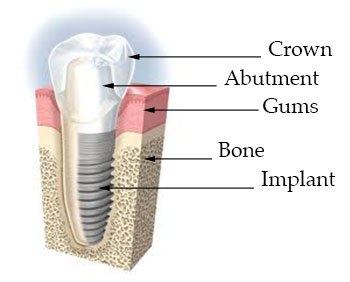Implants
Dental implants preserve the integrity of the facial structure and reduce the inconvenience associated with tooth loss. The implant itself looks like a small screw with a diameter of about 3 - 4 mm and a length of 7 to 21mm. It is made of titanium and it is completely "biocompatible", tolerated and not seen by the human body as a foreign object. The discovery of this property was one of the landmark moments in the history of medicine and was awarded the Nobel Prize.

Implant treatment consists of two phases: surgical and prosthetic.
BEFORE SURGERY
The surgical stage of implant treatment always begins with a consultation with our specialist surgeon. Durning this consultation, our specialist surgeon gathers information about the patient's general health, medical conditions and disorders past and current, in order to exclude any contraindications for implant treatment. During this consultation, a patient has opportunity to present their expectations for cosmetic and prosthetic effects. At this stage, the surgeon will also explain all risks associated with the procedure and explain the warranties and liabilities of the doctor and patient.
Subsequently, based on a panoramic X-ray (OPG) or computer tomography (CT), the doctor conducts an analysis of the patient, checking the bone quality and quantity to check if it is appropriate to take in a standard implant. Otherwise, you might be required to rebuild bones that have been removed in any way through the process of guided bone regeneration or sinus lift jaw. Based on the information gathered, the doctor chooses the correct type and size of implant. At this stage, a detailed treatment plan is also created.
IMPLANTAT PLACEMENT PROCEDURE
Implantat placement procedure or implantation, is a minimally invasive procedure, carried out under local anaesthesia, which makes it completely painless. Depending on the number of implants, this can last from 20 to 60 minutes. The doctor cuts the gums and, using a special drill, prepares the place in the bone into which the implant will be screwed.
The dentist will then check the implant positioning and the wound will be sutured. At this stage, the gum completely covers the implant and no part of it is exposed. Immediately after the implantation, the process of osseointegration begins - that is the natural healing of bone around the implant. The time it takes to complete the integration of the implant with the bone is always determined individually, but it can be assumed that for implants in the upper jaw is approximately 6 months, and in the lower jaw about 2-3 months. After this period, the patient comes to the unveiling of the implant. It is a procedure involving the gingival incision and exposure of the upper part of the implant.
Then, a healing ring is screwed into the implant. This allows for the proper healing of the gums around the exposed implant and models the gum shape around implant for better prosthetic reconstruction. After about 14 days, the patient is ready for the next step - prosthetic reconstruction.
PROSTHETIC RECONSTRUCTION
The course of this stage depends on the predetermined treatment plan. Generally, after the removal of the healing ring, an abutment is screwed into the implant (the part that connects the implant with a crown, bridge or denture) and then impressions are taken. They are later sent to the laboratory where the prosthetic technician prepares a crown, bridge or denture. The last visit is to check the stability of the implant connection with the abutment and attach the crown, bridge or denture. The dentist gives guidance on oral hygiene and schedules visits. Implant treatment is complete at this stage.
Once the implant is in place, it will serve well for many years, as long as the patient takes care of them and keeps the mouth healthy. This means taking the time for good oral hygiene (brushing and flossing) and keeping regular appointments with the dentist.
-
 Scaling10 october 2018 Poldent Dental Care offers professional dental scaling in Wakefield to help you manage plaque and gum disease. Book your deep cleaning session today for a healthier smile![ read more ...]
Scaling10 october 2018 Poldent Dental Care offers professional dental scaling in Wakefield to help you manage plaque and gum disease. Book your deep cleaning session today for a healthier smile![ read more ...]
-
 Dentures6 october 2017 Poldent Dental Care offers high-quality, comfortable dentures in Leeds and Wakefield. Let our experienced team help you regain your confidence with custom-made dentures tailored to your needs.[ read more ...]
Dentures6 october 2017 Poldent Dental Care offers high-quality, comfortable dentures in Leeds and Wakefield. Let our experienced team help you regain your confidence with custom-made dentures tailored to your needs.[ read more ...]
-
 Prevention23 march 2017 Poldent Dental Care offers a range of preventive dental treatments in Leeds and Wakefield to help you maintain a healthy smile. Schedule your hygiene session today![ read more ...]
Prevention23 march 2017 Poldent Dental Care offers a range of preventive dental treatments in Leeds and Wakefield to help you maintain a healthy smile. Schedule your hygiene session today![ read more ...]
-
 Children Dentistry23 march 2017 Poldent Dental Care offers specialised children's dentistry in Leeds and Wakefield. Our friendly and experienced team ensures your child's dental visits are safe, comfortable, and pain-free.[ read more ...]
Children Dentistry23 march 2017 Poldent Dental Care offers specialised children's dentistry in Leeds and Wakefield. Our friendly and experienced team ensures your child's dental visits are safe, comfortable, and pain-free.[ read more ...]
-
 Prosthetics23 march 2017 At Poldent Dental Care, we specialise in prosthetic dentistry, offering advanced solutions in Leeds and Wakefield to restore your ability to chew, speak, and smile confidently. Trust our experienced team for top-quality dental reconstruction.[ read more ...]
Prosthetics23 march 2017 At Poldent Dental Care, we specialise in prosthetic dentistry, offering advanced solutions in Leeds and Wakefield to restore your ability to chew, speak, and smile confidently. Trust our experienced team for top-quality dental reconstruction.[ read more ...]
Previous postsNext posts
